Based on OpenOffice, the beta release of IBM Lotus Symphony office suite of core applications may be old news for many of us in the information technology field (by today's date 10-29-2007).
Notwithstanding, there are other users who might otherwise not have noticed another one of the innovative outcomes due to the Open Document Format (ODF) --the ISO standard advanced by a consortium of industry entities whose aim is to facilitate the exchange of documents amongst heterogeneous operating systems.
"YAH ITS INNOVATIVE !!!!!!!!!!!!!!!!!!!!!!!!!!!!!!!!!!!!!!!!!"
my niece would say. That is because the free and mature office suite component base that we use in the Open Source Software (OSS) world has been extended with productivity components --like the floating task bar on the right of the Symphony framework. It is innovative because it is being designed with open standards, like an Eclipse framework and native ODF support. It is innovative because it has nothing, except the name, of an application of yesteryear.
If you desire to download Lotus Symphony beta for your Windows or Linux operating system, and possibly provide valuable feedback to the IBM Lotus developers of Symphony, please point your browser towards IBM Lotus Symphony office suite home page. Select the Download orange button link on the upper right of the web page --after reading the Installation Guide and Requirements for your operating environment.
Proceed to select either the Linux or Windows version that you desire. You may want to create an IBM ID as a prerequisite for the Symphony download to begin; on the other hand, you have the option of simply providing your first and last names, in addition to your email address for the download process to start.
Please do not forget to agree to the license agreement:
Proceed to select the download method to use by selecting the appropriate tab. You may select either http:
On the other hand, if your browser has the Java plugin installed, select the tab that states Download Director. The latter is an IBM download utility that ensures that your downloaded file integrity is preserved.
After you select the "![]() ownload now" blue button, your Java Download Manager will appear and show you the progress of your process:
ownload now" blue button, your Java Download Manager will appear and show you the progress of your process:
The file for Linux that you have downloaded is, of course, named (as of 09-11-2007) IBM_Lotus_Symphony_Linux.bin. It is a compressed file of more than 200MB of data that you must make sure it has the executable permission set in order for an user to extract. Additionally, although the file can be extracted as an regular user, you will need root (or super user) privilege to install Symphony into your Linux environment.
Open a command shell and become root (or super user) by typing:
su root
and proceed to enter your root password. Subsequently, change directory to DownloadDirector (since I assume there is where your IBM_Lotus_Symphony_Linux.bin file was downloaded but replace with your appropriate location).
Make your file executable with the command:
chmod u+x IBM_Lotus_Symphony_Linux.bin
and proceed to extract the file by entering:
./IBM_Lotus_Symphony_Linux.bin
After the file above will decompress itself into a self-created directory, named IBM_Lotus_Symphony_Linux. The user should change location to that directory:
cd IBM_Lotus_Symphony_Linux
Proceed to execute the program actual installation routine by typing:
./setup.bin
...and be patient. After a short time the IBM Lotus Symphony logo will appear.
Note for OpenSuSE 10.3 users:
As discussed in the thread supported by IBM Lotus Symphony concerned individuals, the following additional export directive is needed for Symphony graphical installation to proceed:
export LIBXCB_ALLOW_SLOPPY_LOCK=1
It should be noted the export directive just discussed is not necessary for CentOS5 nor for Debian Unstable --I installed Symphony into those Linux distributions with no apparent issues.
Subsequenly, the user is prompted to agree to the license by selecting the appropriate radio button:
Then, the install path for Symphony is presented to the user in case s/he wants to alter the default:
And the final screen is presented with the approximate amount of disk space to be used by IBM Lotus Symphony. The user simply selects the Intall button:
And after some minutes, the installation under OpenSuSE finishes and an instance of Symphony Documents application is started --note the floating bar:
Evidently, the root permissions are only necessary for installation of IBM Lotus Symphony. After the office suite is installed, any regular user (with appropriate permissions granted, of course) will be able to select the core applications from the OpenSuSE 10.3 menu:
Or from Linux Debian's menu:
and start another instance of IBM Lotus Symphony Documents application from within CentOS5:
DISCLAIMER:
Please do not hold me or Metztli Information Technology responsible if the information provided here does not achieve the desired result. The information is provided "AS IS" and with the hope that it may be useful to the Internet community.
There is no implicit or explicit guarantee that the the information presented here is accurate. Nor should there be the implict or explicit guarantee that the procedure will not leave your machine in an unforseen unusable state. If an user(s) decide to implement the procedure described here she, he, or them, do so at her, his, or their own risk. You have been forewarned.

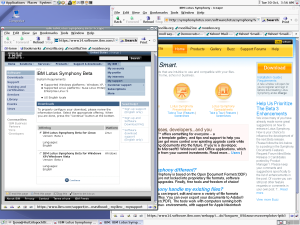
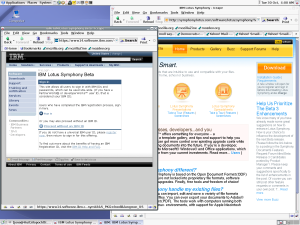
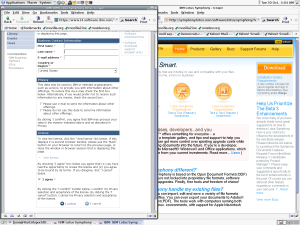
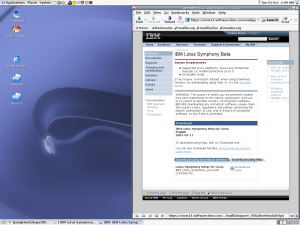
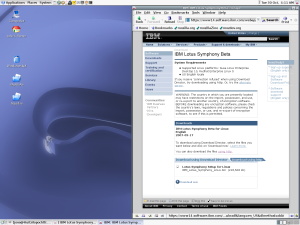
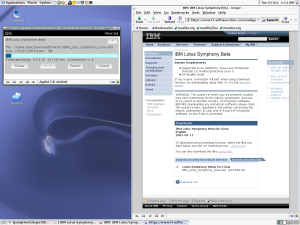
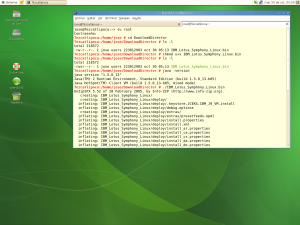
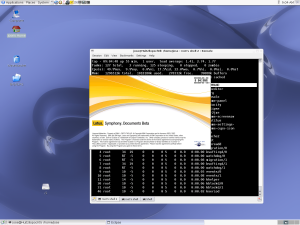
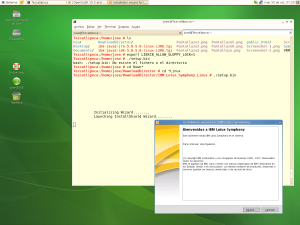
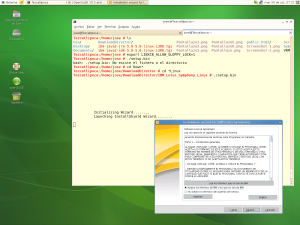
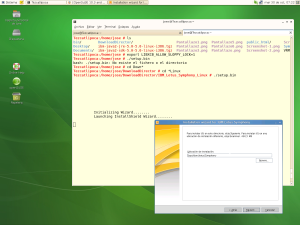
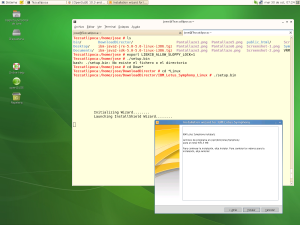
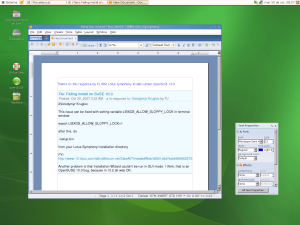
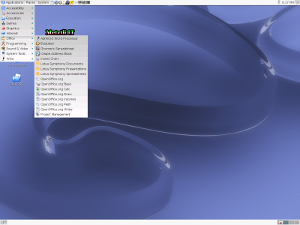
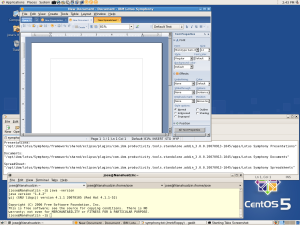
Hi Thanks for information about OpenSuSE! great article!